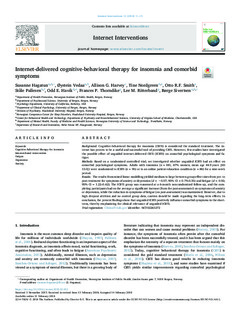| dc.contributor.author | Hagatun, Susanne | |
| dc.contributor.author | Vedaa, Øystein | |
| dc.contributor.author | Harvey, Allison G. | |
| dc.contributor.author | Nordgreen, Tine | |
| dc.contributor.author | Smith, Otto Robert Frans | |
| dc.contributor.author | Pallesen, Ståle | |
| dc.contributor.author | Havik, Odd E. | |
| dc.contributor.author | Thorndike, Frances P. | |
| dc.contributor.author | Ritterband, Lee M. | |
| dc.contributor.author | Sivertsen, Børge | |
| dc.date.accessioned | 2019-02-22T09:29:08Z | |
| dc.date.available | 2019-02-22T09:29:08Z | |
| dc.date.created | 2018-06-03T12:33:54Z | |
| dc.date.issued | 2018 | |
| dc.identifier.citation | Internet Interventions. 2018, 12 11-15. | nb_NO |
| dc.identifier.issn | 2214-7829 | |
| dc.identifier.uri | http://hdl.handle.net/11250/2586945 | |
| dc.description.abstract | Background
Cognitive-behavioral therapy for insomnia (CBTi) is considered the standard treatment. The internet has proven to be a useful and successful tool of providing CBTi. However, few studies have investigated the possible effect of unguided internet-delivered CBTi (ICBTi) on comorbid psychological symptoms and fatigue.
Methods
Based on a randomized controlled trial, we investigated whether unguided ICBTi had an effect on comorbid psychological symptoms. Adults with insomnia (n = 181; 67% women; mean age 44.9 years [SD 13.0]) were randomized to ICBTi (n = 95) or to an online patient education condition (n = 86) for a nine-week period.
Results
The results from mixed linear modelling yielded medium to large between-group effect sizes from pre- to post-treatment for symptoms of anxiety or depression (d = −0.57; 95% CI = 0.79–0.35) and fatigue (d = 0.92; 95% CI = 1.22–0.62). The ICBTi group was reassessed at a 6-month non-randomized follow-up, and the completing participants had on the average a significant increase (from the post-assessment) on symptoms of anxiety or depression, while the reduction in symptoms of fatigue (on post-assessment) was maintained. However, due to high dropout attrition and no control group data, caution should be made regarding the long-term effects. In conclusion, the present findings show that unguided ICBTi positively influence comorbid symptoms in the short-term, thereby emphasizing the clinical relevance of unguided ICBTi. | nb_NO |
| dc.language.iso | eng | nb_NO |
| dc.publisher | Elsevier | nb_NO |
| dc.relation.uri | https://reader.elsevier.com/reader/sd/pii/S2214782917301112?token=80255DD2CA1C7EA28CE63B447CEE9D8E0FA0BE7364EECB758ACCEFA47FA75CFF9108BE88E4473417F6B97BC3EA412EAF | |
| dc.rights | Attribution-NonCommercial-NoDerivatives 4.0 Internasjonal | * |
| dc.rights.uri | http://creativecommons.org/licenses/by-nc-nd/4.0/deed.no | * |
| dc.title | Internet-delivered cognitive-behavioral therapy for insomnia and comorbid symptoms | nb_NO |
| dc.type | Journal article | nb_NO |
| dc.type | Peer reviewed | nb_NO |
| dc.description.version | publishedVersion | nb_NO |
| dc.source.pagenumber | 11-15 | nb_NO |
| dc.source.volume | 12 | nb_NO |
| dc.source.journal | Internet Interventions | nb_NO |
| dc.identifier.doi | 10.1016/j.invent.2018.02.003 | |
| dc.identifier.cristin | 1588533 | |
| dc.relation.project | Norges forskningsråd: 259293 | nb_NO |
| dc.description.localcode | © 2018 The Authors. Published by Elsevier B.V. This is an open access article under the CC BY-NC-ND license (http://creativecommons.org/licenses/BY-NC-ND/4.0/). | nb_NO |
| cristin.unitcode | 194,65,0,0 | |
| cristin.unitname | Fakultet for medisin og helsevitenskap | |
| cristin.ispublished | true | |
| cristin.fulltext | original | |
| cristin.qualitycode | 1 | |

